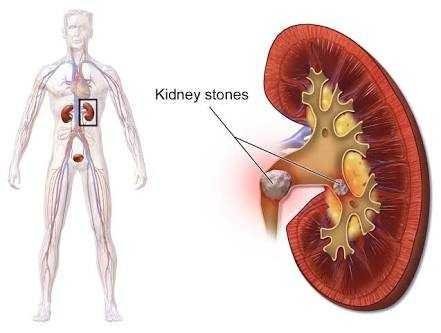Kidney Stones

Kidney stones or Nephrolithiasis are hard crystalline materials that are formed as a result of excess salt and mineral that is stored in the kidney. They can be stored in the ureters, the bladder or the urethra. Kidney stones pass through ureter to the bladder when they wish to. They include calcium oxalate which is made up of many compounds. They can develop up to the size of a ping pong ball.
Kidney stones are very dangerous and can be painful especially when they block the flow of urine. They are the usual cause of hematuria. Researcher has figured out that about 5 percent of people experience this problem in their lifespan. The rate of people with this problem continue to increase in the United States while the reason behind this is yet to be discovered. A survey has shown that men and women are likely to develop kidney stones in their 40s and 50s respectively.
Symptoms
Symptom of kidney stones can be difficult to know, until they travel down to the ureter and the bladder. Some of the symptoms include:
Blood in Urine: When these stones get into the bladder, they can block the flow of urine which can lead to blood in the urine.
Severe Pain: Kidney stones can cause severe pain in the body of the person sufferings from the problem while the lower back, groin and abdomen are the target of the pain.
Vomiting and nausea: People suffering from kidney stones are prone to vomiting
Reduced amount of urine: When the stones get to the bladder, they block the flow of urine which later result into reduced amount of urine excreted
Burning sensation during urination: One of the symptoms of kidney stones is that the person may offen experience burning sensation before or during urination.
Fever: This problem can also lead to fever when there is an infection.
Causes
Dehydration: Insufficient fluid intake or lack of water is the major cause of kidney stones in the body. People who take the recommended amount of water (8-10 glasses of water in a day) hardly have stones in their kidney.
When there insufficient fluid to dilute the uric acid then it becomes more acidic in the body, and when the acid becomes more severe then it leads to the development of stone.
Obstruction during urination can also lead to the formation of stone in the kidney. Some people (especially children) are fond of using their hand to obstruct or block on-coming urine in their penin.
A person having one or more family members with kidney stone is likely to develop the problem.
People suffering from some chronic diseases or infection such as diabetes and high blood pressure are likely to develop kidney stones.
Diet is also one of the leading cause of kidney stones. Excessive intake of salt, sugar and animal protein can be linked to kidney stones.
Treatments
These treatments can be used to treat or remove some stones that decided not to come out. These include:
Medication: If you notice that some stones are not yet out or difficult to come out. Then, you can be prescribed a drug known as alpha blocker by your doctor. This drug will help you pass the stones without stress or difficulties. This works perfectly for smaller stones
Shock Wave lithotripsy (SWL) : This treatment works perfectly for larger stones. It procedures helps to break the larger stones in small or tiny pieces, which makes it easy to pass the stones outside.
Try Ureteroscope: This can be used to remove tiny stones from by passing the ureteroscope through the ureter. These procedures can be painful and may require anesthesia.
Nephrolithotomy surgery: larger stones that seems stubborn to be broken might need the use of nephrolithotomy surgery to bring out the kidney stones.
Congratulations, your post has been chosen by curators of eSteem Encouragement program. Feel free to join and reach us via Discord channel if you have any questions or would like to contribute.
Thank you for using eSteem